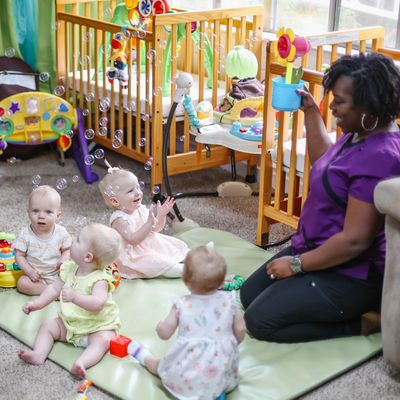The Significance of Interactive Tasks in Quality Institution Education And Learning
Interactive activities play a crucial duty in elementary school education and learning. They involve pupils and boost discovering outcomes. Via team tasks and hands-on experiments, students experience the material in a sensible method. This approach accommodates diverse learning styles and advertises vital skills. However, the benefits prolong past academics. Checking out the deeper impact of these tasks discloses their relevance in forming young learners' futures. What improvements take place when trainees actively take part?
Enhancing Involvement Through Interactive Learning
Although typical training approaches have their merits, interactive knowing substantially improves student involvement in quality school education. This approach motivates energetic involvement, enabling pupils to submerse themselves in the knowing process. By making use of team activities, hands-on experiments, and technology-driven resources, teachers create an atmosphere where students feel extra linked to the material.
Interactive discovering promotes collaboration among peers, cultivating communication skills and teamwork. It likewise satisfies diverse learning styles, making sure that aesthetic, acoustic, and kinesthetic learners can all thrive. In addition, students are most likely to preserve information when they proactively take part, as opposed to passively obtaining understanding.
This vibrant technique not only makes discovering satisfying yet also imparts a sense of ownership in trainees concerning their educational journey. As they engage with the content, their inquisitiveness and inspiration to learn boost, laying a strong structure for future scholastic success.
Establishing Vital Believing Abilities
Interactive learning not only boosts involvement but also serves as a catalyst for creating important thinking skills in quality school pupils. With tasks such as problem-based knowing, disputes, and hands-on experiments, trainees are motivated to examine information, evaluate various viewpoints, and create reasoned verdicts. These interactive experiences need students to question assumptions, leading them to believe even more deeply about different topics.

Interactive activities typically existing real-world circumstances that test students to use their expertise creatively. By maneuvering via these challenges, they learn to identify appropriate information and make educated decisions. This process fosters not only specific critical thinking yet likewise urges pupils to express their believed procedures, improving their ability to interact efficiently. As a result, interactive discovering settings cultivate a generation of essential thinkers who are better prepared to deal with complex issues in their future academic and expert undertakings.
Promoting Cooperation Amongst Peers
Cultivating collaboration amongst peers is important in grade institution education, as it enhances teamwork and interaction abilities. Involving in group activities aids trainees construct trust and respect for one another, preparing for efficient partnership. In addition, analytical with each other enables trainees to learn from each other and create a cumulative strategy to challenges.
Team Effort and Interaction Abilities
Efficient team effort and interaction skills are necessary parts of a successful quality college education. Engaging in interactive activities motivates trainees to work together, share ideas, and resolve troubles with each other. Such experiences promote the growth of essential communication capacities, enabling children to share their ideas clearly and pay attention actively to others. With teamwork, pupils discover to value diverse point of views, cultivating a sense of neighborhood and shared obligation. Structured team jobs, whether in academics or imaginative jobs, improve peer interactions, instructing youngsters just how to discuss duties and solve problems. These skills not just contribute to a favorable class environment but additionally prepare students for future joint ventures in greater education and the office. Overall, teamwork and communication are foundational to all natural growth in quality college.
Structure Trust Fund and Respect
Structure trust fund and regard among peers offers as a cornerstone for effective partnership in grade school settings. When trainees feel valued and appreciated by their classmates, they are most likely to involve proactively in group activities. Interactive activities, such as group jobs and cooperative games, provide chances for pupils to gain from one an additional, cultivating a sense of neighborhood. This atmosphere encourages open interaction, allowing pupils to reveal their concepts and point of views without worry of judgment. As depend on constructs, pupils become a lot more happy to share responsibilities and sustain each other's learning. Ultimately, cultivating an ambience of trust and regard boosts not Check This Out just academic results however also social growth, equipping students with essential interpersonal abilities for their future undertakings.
Problem-Solving With each other
Collaborative problem-solving engages trainees in critical reasoning and team effort, crucial skills for their individual and scholastic growth. When students function with each other to take on obstacles, they find out to interact properly, regard diverse viewpoints, and leverage each various other's staminas. This procedure improves their capability to assess problems from various angles and develop imaginative options. Group activities, such as scientific research experiments or math difficulties, promote energetic engagement and foster a feeling of neighborhood. As pupils work together, they additionally develop social skills, finding out to negotiate and endanger, which are crucial for future communications. Ultimately, analytic with each other grows a supportive understanding setting, equipping students to take ownership of their education and learning while preparing them for collective ventures past the class.
Urging Creative Thinking and Innovation
Urging imagination and development in elementary school education can be significantly improved with hands-on discovering experiences. These activities permit pupils to engage straight with concepts and products, promoting imaginative thinking. Furthermore, joint team tasks can boost diverse ideas and solutions, further supporting an innovative environment.
Hands-On Understanding Knowledge
A wide range of hands-on understanding experiences substantially enhances imagination and innovation in elementary school education. Involving students in sensible tasks allows them to use academic expertise in real-world contexts, fostering much deeper understanding. By manipulating tools and products, youngsters create important problem-solving skills and learn to think outside package. These experiences inspire curiosity and inspire students to discover their interests additionally. In addition, hands-on activities can link different topics, connecting scientific research, art, and math in purposeful ways. This interdisciplinary technique motivates trainees to see links and assume artistically. Ultimately, hands-on knowing experiences nurture a generation of pioneers, outfitting them with the skills and self-confidence required to tackle future obstacles and contribute to culture in special methods.
Collaborative Group Projects
Hands-on knowing experiences normally lead to the unification of joint team projects, which play a crucial role in fostering creative thinking and development in grade school education and learning. These projects urge trainees to interact, sharing perspectives and ideas, which boosts analytical abilities and crucial thinking. Through partnership, pupils learn to interact properly and respect varied viewpoints, essential skills for their future. Furthermore, group projects give opportunities for pupils to explore different duties, raising their versatility and confidence. Participating in this participating setting enables them more to discover their imagination, pressing the limits of traditional discovering. Ultimately, joint team tasks not just enrich the instructional experience yet likewise prepare trainees for real-world obstacles that call for synergy and innovative reasoning.
Building Self-confidence and Self-reliance
As trainees involve in interactive activities, they usually uncover possibilities to construct self-confidence and freedom. These tasks, whether they entail hands-on tasks, role-playing, or analytical jobs, encourage pupils to take campaign and reveal their concepts freely. By joining such experiences, students learn to trust their capabilities and make choices without relying entirely on assistance from teachers or peers.
Additionally, interactive activities foster a sense of ownership over knowing. When pupils deal with challenges collaboratively or independently, they establish important assuming skills and resilience. This procedure not just enhances their understanding of the subject but additionally empowers them to take risks in their discovering journey.
As they browse different interactive situations, pupils slowly dropped their insecurity, leading the means for increased self-esteem - Private Grade School Peoria. Eventually, these activities play an important duty in nurturing independent and positive learners, furnished to face future academic and personal difficulties
Producing a Favorable Classroom Setting
While promoting a favorable class setting is essential for efficient understanding, it needs intentional effort from educators to produce a room where students really feel secure, revered, and engaged. A favorable ambience encourages cooperation, enabling students to express themselves without worry of judgment.
Educators can achieve this by developing clear assumptions, promoting mutual respect, and acknowledging individual payments. Incorporating interactive activities further boosts interaction, making discovering more vibrant and delightful.
Furthermore, a caring setting sustains social-emotional advancement, as pupils find out to browse partnerships and resolve conflicts. Teachers play an essential duty in modeling positive habits and reinforcing a society of kindness and inclusivity.
Frequently Asked Questions

Exactly How Can Parents Support Interactive Learning in your home?
Moms and dads can sustain interactive discovering in your home by giving engaging materials, urging hands-on tasks, incorporating instructional video games, fostering discussions, and producing a nurturing setting that advertises curiosity and exploration in their children's finding out experiences. (Kindergarten)
What Types of Interactive Activities Are Many Efficient?
Hands-on tasks, collaborative games, role-playing situations, and instructional modern technology applications are amongst one of the most efficient interactive activities. These involve trainees, boost vital thinking abilities, and advertise synergy, inevitably fostering a much why not find out more deeper understanding of various subjects.
How Do Interactive Tasks Deal With Various Discovering Styles?
Interactive activities engage aesthetic, acoustic, and kinesthetic students by integrating varied methods. These activities assist in understanding via hands-on experiences, joint conversations, and aesthetic aids, permitting trainees to absorb info according to their favored understanding design.
What Are the Costs Linked With Applying Interactive Tasks?

Executing interactive activities incurs costs such as materials, training for instructors, innovation upgrades, and possible facility modifications. Spending plan restraints can also affect the frequency and selection of activities supplied to trainees in academic settings.
How Can Teachers Examine the Effect of Interactive Knowing?
Educators can analyze the impact of interactive understanding through monitorings, trainee feedback, performance metrics, and relative analysis of test scores prior to and after execution, making sure a complete understanding of involvement and expertise retention renovations.
With activities such as problem-based understanding, arguments, and hands-on experiments, students are motivated to evaluate information, evaluate different point of views, and create reasoned final thoughts. Interactive tasks typically present real-world situations that challenge trainees to apply their expertise creatively. Involving in interactive activities motivates students to work together, share concepts, and solve problems together. Interactive activities, such as team projects and participating video games, provide possibilities for trainees to discover from one an additional, cultivating a sense of community. As students involve in interactive tasks, they typically uncover opportunities to construct confidence and freedom.